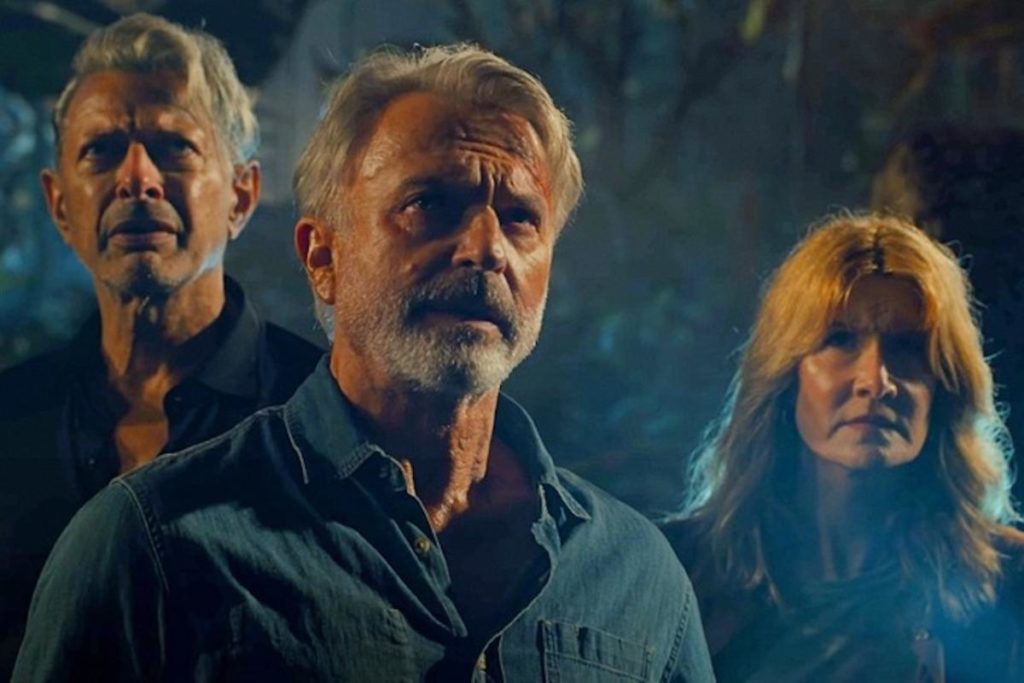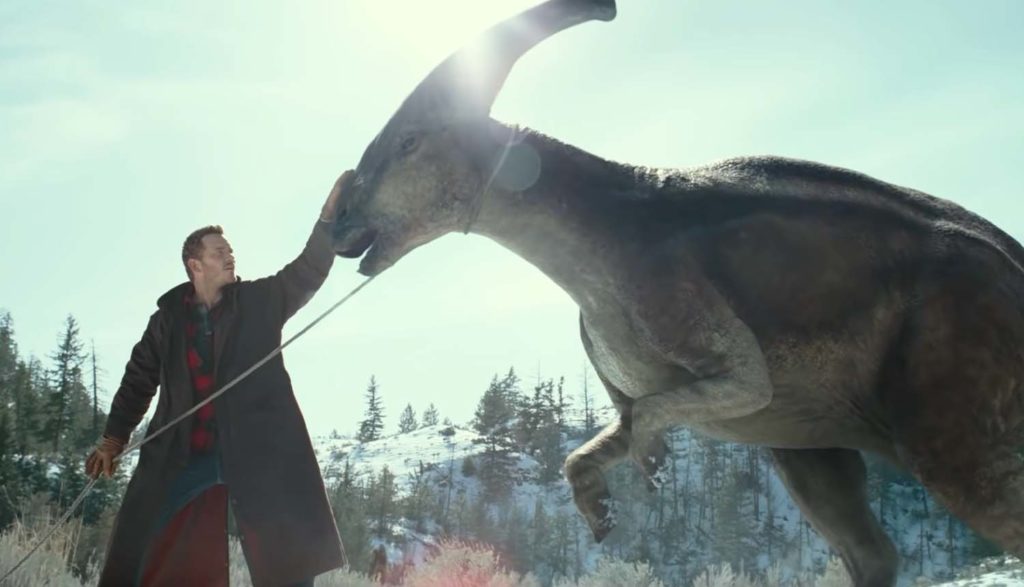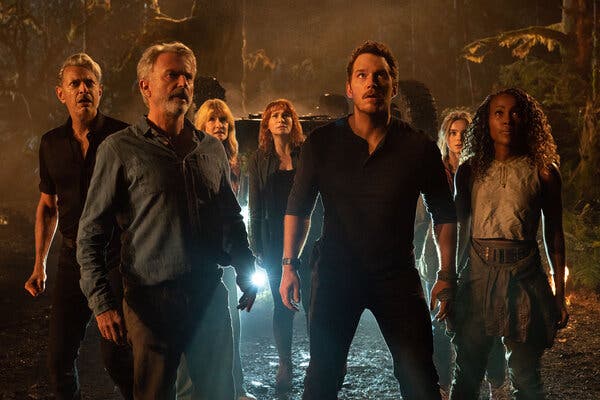Are screenwriters even trying anymore?
Genre: Sci-Fi/Action
Premise: An evil corporation charged with protecting dinosaurs uses their research to create a worldwide food collapse and it’s up to some old Jurassic Park friends to stop it!
About: The final film in the Jurassic World trilogy pulled in 143 million dollars. For some reference, Jurassic World, the first film in the new trilogy, made 208 million dollars. The original Jurassic Park made 95 million in its opening weekend when adjusted for inflation. The newest film in the franchise was promoted mainly by the return of legacy characters.
Writers: Story by Derek Connolly and Colin Trevorrow. Screenplay by Colin Trevorrow and Emily Carmichael
Details: 2 hours and 30 minutes

You may be asking yourself, why are you even reviewing this, Carson?
In the landscape of cinema, it’s about as unimportant a big-budget Hollywood release as there is.
There are two reasons.
One, Jurassic Park remains the single best movie concept ever. A theme park with real dinosaurs. There isn’t an idea out there that beats it. So I think that’s worth covering as a screenwriting critic. As much as you want to dig into the weeds on how to write a good screenplay, it all comes down to the idea. If people like your idea, they want to read your script. If they don’t, they don’t.
The second reason is that I’m fascinated by Colin Trevorrow’s career.
He broke through with a decidedly average indie movie, Safety Not Guaranteed. Based on that movie, he got the Jurassic World job. Jurassic World massively over-performed, which led to him getting the Star Wars Episode 9 job. He then made The Book of Henry, which had one of the most ridiculous plots ever known to man. The badly received film got him fired from Episode 9, which left him with nowhere to go. So he came back to Jurassic World for this movie.
But after this film, he no longer has the franchise for cover. He’s out there naked to the world and, therefore, if things don’t go right, he could become the next Joel Schumacher or John McTiernan. So you want to finish the franchise off with a good movie. Because good movies are memorable and you can use that to book jobs.
I know Trevorrow is already set to make an Atlantis movie, which I think is a smart move for him. But if this film’s box office takes a massive dive in its second week because word-of-mouth is so bad, there’s no guarantee that that Atlantis film will be made.
 I have no idea what’s going on here.
I have no idea what’s going on here.
So what’s this latest film about?
Oh boy.
I’m going to keep this as short as possible. A company called Biosyn has created a sanctuary for dinosaurs. Also, a new type of Dino-locust (aka a really big locust) is eating up all the crops across the planet. Conveniently, Biosyn has a pesticide that prevents the locusts from eating crops. Buy Biosyn and your crop problems are solved.
Out in the middle of nowhere, Owen (Chris Pratt) and Claire (Ron Howard’s daughter) are raising Maisie, a clone of her mother, who died. The same bad guys who kidnapped Baby Leia also kidnap Maisie. This means Owen and Claire have to find her.
Meanwhile, legacy characters and scientists, Ellie and Allen, are recruited by Biosyn to try and figure out why these locusts are killing all the crops. So they come to Biosyn Headquarters where they meet up with Jeff Goldblum, who I guess is teaching classes there. They eventually also meet up with Owen and Claire, who have tracked Maisie back to Biosyn. The group then escapes, forcing them to take on all the dinosaurs in the sanctuary.

I’ve been noticing a lot of reviews of this movie focusing on the bad writing.
Those reviews are correct.
However, as always is the case with screenwriting, there’s a nuanced discussion to be had. I just think the task here was so big that it overwhelmed the writers, which is why the story is so clunky.
First off, you’ve been told you have to bring in the legacy characters in a significant role. Which means you have to create a parallel storyline for them. And this is where things get messy.
While it’s true that parallel storylines are part and parcel in today’s mega-blockbusters – The Avengers have so many characters, they have no choice but to split them up – the tough part about Dominion is that our current characters in the series aren’t connected to the legacy characters. So it can’t be a collaborative storyline that splits them apart. It has to be separate.
And this is where the bulk of the movie’s problems originate. Alan and Ellie (our original Jurassic Parkers) are wrapped up in an oddly complicated locust storyline whereby if they don’t figure out how to stop the spread of the larger Jurassic locusts, the locusts will single-handedly destroy the planet’s food chain.
Meanwhile, Owen and Claire are involved in a traditional Taken-style storyline where they have to retrieve their adopted daughter. This was actually a smart move by the writers, who must’ve realized how laborious the locust storyline was and figured they had to offset it with the simplest storyline possible.
Ironically, either the director or the producers or someone else wasn’t satisfied by that simplicity, and therefore decided to make the daughter’s storyline evolve into something even MORE complicated than the locust storyline. Without getting into detail, the adopted daughter is a clone who has overcome a deadly genetic disease and, therefore, Biosyn must use her to figure out how to stop the locusts.
You’d think that, at some point, someone would’ve said, “This is just way too complicated.” But once these big movies get moving, they’re like a tidal wave. They’re not going to stop until they hit shore. And whatever they’ve accumulated along the way is coming with.
The crazy thing is, if you break it all down – every single plot development in this movie – it *does* make sense. But therein lies the problem. Audiences don’t come to movies to make sure they make sense. They come to be entertained. So that should always be your primary directive. Sure, you don’t want plot holes. But plot holes are not above entertainment on the movie priority list.

What’s so frustrating is that you could see the writers *trying* to do the right thing. You have the cloned girl, Maisie. The writers went really deep into her backstory and her flaws and her conflicts to create an emotionally complex character. That’s what we’re told to do, right? Create complex characters. So this is right, right?
Or you have Dr. Henry Wu. Dr. Wu is responsible for creating these locusts that will destroy the food supply in order to help Biosyn sell the solution to everyone. He then has a change of heart, realizes what he did was wrong, and attempts to right that wrong by kidnapping Maisie to study her genetic abnormalities in order change the genetic code of the locusts so that they’ll all die off.
Look at how complex this character is. He did something terrible. Now he’s trying to make it right. So he does something terrible again, in an attempt to make it right. Isn’t this exactly what we tell screenwriters to do? Make these complex characters who have all of these conflicts inside of them? They’re both good and bad. That’s proper character construction, right?
In addition to this, we have a brand new character, a sort of Indiana Jones type, named Kayla Watts, played by DeAndra Wise. She’s a pilot with an attitude. Kayla also becomes part of the complex character brigade. She’s been a thug-for-hire her entire career, always chasing the buck over doing the right thing. She stands by as Maisie is kidnapped, has a crisis of conscience about allowing the Jurassic Park version of child trafficking, and decides to help the good guys to right her moral wrong.
Again, on paper, we’ve got a complex character here. I can imagine the writer’s room discussions over this character. How interesting she is for having zero morals her whole life then finally deciding to do the right thing instead of collect a paycheck. I’m sure there were a few people in the room crying about how powerful her arc would be.

So how come not a single audience member cared about these three characters?
There’s an acronym that’s popular in the sports world called “KYP.” It stands for Know Your Personnel. And never has this acronym been more relevant than in regards to this movie. The reason you’ve got three extremely complex characters that nobody is responding to is because they’re the wrong characters. People aren’t coming to this movie to hang out with these three randos.
They’re coming to hang out with Owen, with Clair, with Ellie, with Alan, with freaking Jeff Goldblum. That’s your movie right there. And the fact that you spent all this time building up characters that never stood a chance no matter how well they were written, shows an inability to recognize what people care about.
This is exactly why Top Gun has taken over the world. It recognized that people wanted to see Tom Cruise.
Granted, Chris Pratt’s “Owen” is no Tom Cruise. With that said, there was ZERO attempt to do anything with his character. THE LEAD CHARACTER IN THE FILM! He’s got like 10 lines the whole movie. Yet Boring Indiana Jones Ripoff Girl gets 90% of the dramatic beats in the movie. It was a bizarre decision to say the least.
Speaking of, there was a lot of blowback in the last two movies regarding Owen and Claire bickering with each other. A lot of people called it misogynistic or something. Well, those critics and Twitter users bullied the filmmakers into getting rid of that dynamic. And, in the process, they made Owen and Claire’s interactions the single most boring interactions between two leads you’ve seen in a movie all year.
So the next time you’re thinking of changing something because of people complaining on Twitter, consider what that actually does to the entertainment value of your movie. You’d already neutered Owen as a character. To then neuter his relationship as well… it made these two characters invisible.
I’m not pretending that any of the solutions here are easy. As a screenwriter on a major blockbuster, you’re juggling 10,000 plates. But someone on this team should be reading Scriptshadow. Because I remind people all the time of the best screenwriting advice on the market: KEEP IT SIMPLE STUPID.
The more complex you make your screenplay, the worse it’s going to be.
This film is the latest example of that.
[ ] What the hell did I just watch?
[x] wasn’t for me
[ ] worth the price of admission
[ ] impressive
[ ] genius
What I learned: If you’ve ever been confused by the note, “Too much plot,” watch this movie. This movie is the poster child for “too much plot.” Generally speaking, if almost every scene in your script has your characters explaining something, it means that your plot is too overbearing.
What I learned 2: Be aware of “negative space.” Sometimes as writers we will eliminate a problem in our screenplay but not replace it with a solution. Therefore, what’s left in its place is “negative space.” That’s what happened here with the “bickering couple” criticism that had Trevorrow erase all bickering between Owen and Claire. True, he got rid of the problem. But he didn’t replace it with a solution. He just left negative space. This is the same thing that happened with Jyn Erson in Rogue One. They quickly realized that Jyn came off as “bitchy.” So they erased all moments where Jyn was bitchy. They got rid of the problem. But they didn’t come up with a solution. This is why Jyn Erso is one of the most forgettable Star Wars characters ever. You can’t just erase the problem. You gotta replace it with a solution.

